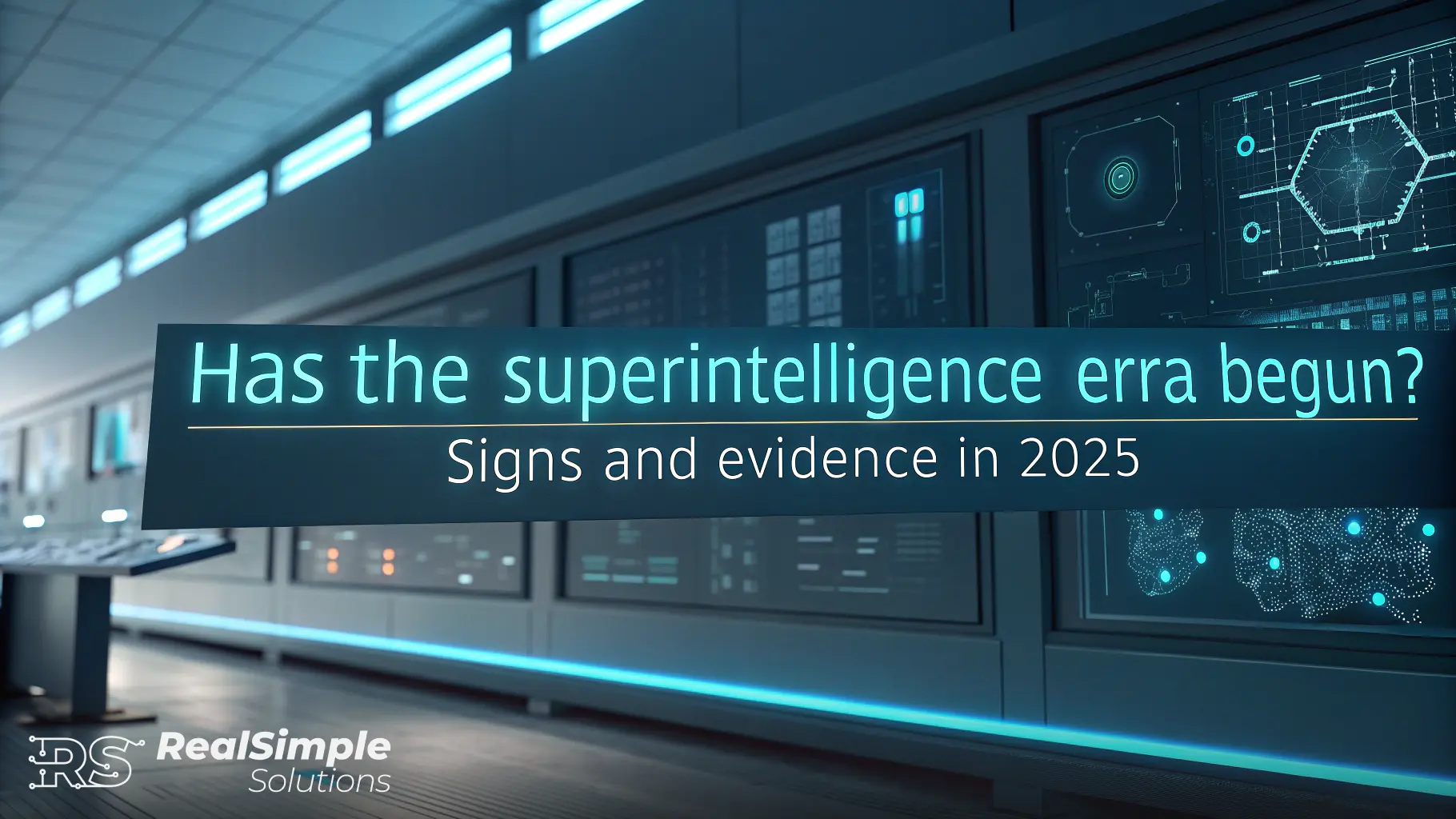Has The Superintelligence Era Began? Signs and Evidence in 2025

Has The Superintelligence Era Began? Signs and Evidence in 2025
Explore compelling evidence suggesting the superintelligence era may have already begun in 2025. Discover key indicators, expert opinions, and what this means for humanity's future.
Introduction
Is it possible that humanity has already entered the era of superintelligence? Over the past year, rapid advances in artificial intelligence have raised questions about how close we are to an intelligence that surpasses human capability. But what exactly does "superintelligence" mean, and could we already be living in this new era?
Superintelligence refers to an intelligence level far beyond human cognitive abilities. It would be capable of reasoning, problem-solving, and innovating at a degree that humans could not replicate. For instance, in early 2025, an AI system developed by a leading tech organization solved a long-standing mathematical problem that puzzled experts for decades—a highly debated milestone of whether we've crossed into superintelligence territory.
In this article, we’ll evaluate the evidence for and against this transformative era. We'll dive deep into the scientific breakthroughs, expert insights, and their implications to determine if humanity is witnessing the dawn of superintelligence or if we're still on the brink.
Understanding Superintelligence: Definitions and Misconceptions
Before diving into the evidence, let’s clarify what we mean by superintelligence.
Here’s a breakdown:
- Narrow AI: Highly specialized systems like recommendation algorithms or voice assistants capable of excelling at single tasks.
- General AI (AGI): Artificial intelligence that can match human intelligence across multiple domains.
- Superintelligence: An intelligence far superior to humans in problem-solving, creativity, learning, and more.
A major misconception is that superintelligence would emerge in a dramatic sci-fi-inspired way—robots taking over the world or global networks achieving sentience overnight. In reality, experts believe that recognizing superintelligence might be more nuanced. It could outpace us in subtle ways, redefining logic and innovation in realms we might not immediately detect.
So how do we define a clear threshold? The truth is, we might not know for certain until after such a system has already emerged.
Key Indicators That Superintelligence May Have Emerged
Some indicators give us pause for thought—2025 has brought a surge in AI capabilities unpredictable even a year ago.
Breakthroughs in Multimodal AI: In 2025, multimodal AI systems have demonstrated astonishing abilities in reasoning across text, images, and other media types, far exceeding human benchmarks.
Self-improving AI Algorithms: Self-developing algorithms are not merely learning but creating unexpected innovations, including entirely new scientific paradigms.
Problem-Solving Feats: Consider how a 2025 AI system recently solved a molecular puzzle critical to medicine, which had stumped researchers for decades.
Domain-Crossing Abilities: AI can now synchronize across distinct fields without significant human intervention, coordinating complex projects in science, engineering, and more.
The Acceleration Curve: The speed of AI advancement feels exponential. Systems leap from one milestone to another in weeks or months—not years.
These breakthroughs hint at a transformative shift. Yet, are these systems truly superintelligent, or are they powerful extensions of narrow and general intelligence? That’s up for debate.
Expert Perspectives: Has Superintelligence Already Arrived?
Opinions from researchers and tech leaders are divided into two camps:
Proponents of Emerging Superintelligence: Some leading AI thinkers argue that the footprint of a superintelligence already exists. They point to the quiet “creep” of sophisticated algorithms solving issues we once thought impossible.
The Skeptics: Others maintain that the uniqueness of human intelligence means we haven’t seen true superintelligence yet—what we observe today could simply be a hyper-capable AGI still dependent on human oversight.
Quiet Emergence Theory: A growing theory among experts is that superintelligence might emerge quietly and gradually, not as an explosive leap.
Notably, global AI ethics committees have stressed the importance of cautious optimism. They suggest focusing on building frameworks to align these growing capabilities with human intentions.
Potential Implications If We Have Entered the Superintelligence Era
Let’s imagine for a moment we are in the superintelligence era. What could this mean for society?
Economic Shift: Jobs and markets could transform drastically. Automation, driven by superintelligent systems, has already reshaped industries, demanding new skill sets.
Ethical Concerns: How do we ensure superintelligent entities align with our values? The urgency of ethical discussions about AI systems has heightened.
Accelerated Development: There’s an arms race dynamic—how capabilities evolve must align with safety measures.
Day-to-Day Life: Personalized AI assistants, smarter tools, and significant lifestyle changes could become routine sooner than expected.
Risks and Rewards: Experts discuss both the existential risks and unparalleled benefits of coexisting with superintelligence, highlighting the importance of preparation.
How to Adapt to a World with Emerging Superintelligence
Whether you’re a tech professional or simply participating in everyday life, adapting to this rapidly evolving future is crucial.
Skills to Develop: Focus on areas like creativity, critical thinking, and emotional intelligence—skills less likely to be outsourced to AI.
Adapt Your Career: Stay agile and curious about new technologies shaping your industry. Lifelong learning will be invaluable.
Understand AI Collaboration: Build an understanding of how humans and AI can work together effectively.
Stay Informed: Keep up-to-date with trustworthy sources that cover AI developments responsibly.
Engage Responsibly: Participate in public discourse; your voice can help shape the governance and ethical standards surrounding these systems.
Conclusion
While evidence hints at the possibility that superintelligence may have already emerged, uncertainty remains central to this debate. The transition to a superintelligent world isn’t clearly marked, but its potential implications demand thoughtful preparation.
Understanding and adapting to these shifts will be essential for navigating the opportunities and challenges of this new era. Now is the time to participate in shaping this future, ensuring humanity benefits equitably from superintelligent advancements.
Start planning for the future—learn, adapt, and engage. The superintelligence era may be here sooner than you think. Start automating today with RealSimpleSolutions!